|
|
|
Sort Order |
|
|
|
Items / Page
|
|
|
|
|
|
|
| Srl | Item |
| 1 |
ID:
146542
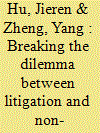

|
|
|
|
|
| Summary/Abstract |
Focusing on the dispute resolution mechanisms for defusing various social disturbances and collective incidents during the reform period and particularly in the last decade, this paper argues that the Chinese government has adopted pragmatic and problem-solving approaches to designing and developing various mechanisms of dispute resolution in response to the complicated and challenging situation of steadily increasing and intensifying social contention. There is evidence that neither litigation nor non-litigation means of dispute resolution can effectively resolve social conflicts. In light of this difficulty, various experiments have been put in place at the local level to meet social needs and manage social crises while balancing state power and social self-governance. We call such experiments “diversified mechanisms of dispute resolution (DMDR).” This study sheds light on the shift from an emphasis on the earlier non-litigation approach to a more diversified way of addressing collective disputes in contemporary China.
|
|
|
|
|
|
|
|
|
|
|
|
|
|
|
|
| 2 |
ID:
158330
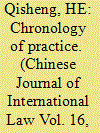

|
|
|
|
|
| Summary/Abstract |
This paper is composed of materials reflecting the practice of private international law in China in 2016. First, this paper covers the report of the Supreme People’s Court (SPC) released in 2017, notably the Report on the Work of the SPC in 2016, which contains the statistics of the foreign-related civil or commercial cases accepted and concluded by Chinese courts. Second, the paper covers judicial interpretations that took effect in 2016. The important legal instruments that have been translated include: the Provisions of the SPC on Several Issues concerning the Trials of Independent Guarantee Cases and the Provisions of the SPC on Several Issues concerning the Adjudication of Cases Occurring in the Sea Waters under China’s Jurisdiction (I). Third, this paper focuses on typical cases decided by various Chinese courts during 2016 that dealt with the following issues: agent ad litem; jurisdiction (involving representative office and forum non conveniens); choice of law (classification of legal relationship, gambling debt, loan contract); proof of foreign law; recognition and enforcement of a Singapore judgment; validity of the dispute resolution clause containing both litigation and arbitration; recognition and enforcement of foreign arbitral awards (involving the review at the request of the party or ex officio review by the court, procedure review, qualification of arbitrator, division of arbitration costs, excess of authority and division of an arbitral award, and public policy).
|
|
|
|
|
|
|
|
|
|
|
|
|
|
|
|
| 3 |
ID:
156859


|
|
|
| 4 |
ID:
032852


|
|
|
|
|
| Publication |
Uppsala, Uppsala University, 1970.
|
| Description |
41p
|
|
|
|
|
|
|
|
|
|
|
|
Copies: C:1/I:0,R:0,Q:0
Circulation
| Accession# | Call# | Current Location | Status | Policy | Location |
| 016624 | 303.69/HOG 016624 | Main | On Shelf | General | |
|
|
|
|
| 5 |
ID:
142286
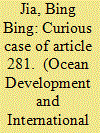

|
|
|
|
|
| Summary/Abstract |
This article discusses the issue of treaty regimes in parallel to the United Nations Convention on the Law of the Sea in respect of peaceful settlement of disputes concerning the interpretation or application of the Convention. The duality in relevancy of such disputes to two treaties at the same time would have begged the question about which treaty should be applied to settle them, but UNCLOS has a clear, conflict-of-law style rules in place to address the question. Article 281(1) is one such rule, and, with its exclusionary effect, stands out as a super provision of the Convention.
|
|
|
|
|
|
|
|
|
|
|
|
|
|
|
|
| 6 |
ID:
093222


|
|
|
| 7 |
ID:
088689
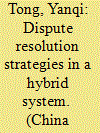

|
|
|
| 8 |
ID:
178745
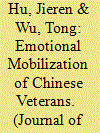

|
|
|
|
|
| Summary/Abstract |
Based on in-depth interviews of Chinese veterans and specifically focusing on the cadets in Shanghai, this article explores the mechanism of emotional mobilization of this highly organized contentious group vis-à-vis other disorganized and dispersive one such as labors and homeowners. It reveals that strong emotional ties with comrades in troops and the despondency brought about by the Chinese Communist Party’s (CCP) ineffective redress to their demands have rendered Chinese veterans, who see themselves rhetorically glorified and embodying heroic status in the country, protesting for their military identity and military rank recovery for decades. In order to defuse veterans’ grievances, flexible governance, which stresses emotional care and affection by petition social workers, is deployed by the Party-state to settle disputes that beyond law and policy.
|
|
|
|
|
|
|
|
|
|
|
|
|
|
|
|
| 9 |
ID:
122193
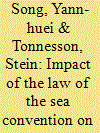

|
|
|
|
|
| Publication |
2013.
|
| Summary/Abstract |
This article examines the impact of the UN Law of the Sea Convention on conflict behavior and management in the South China Sea during four periods: during its negotiation (1973-1982); from its signing to the entry into force (1982-1994); from then until the China-ASEAN Declaration on the Conduct of Parties in the South China Sea (1995-2002); and from the setting of a timeline for outer limits of continental shelf submissions to the events following the 2009 submissions (2003-2013). Ambiguous effects were found. On the one hand, the Convention has generated or exacerbated conflict by raising the stakes, failing to resolve key legal issues, and encouraging overlapping zone claims. On the other hand, it has provided obligations, language, and techniques for conflict management and resolution. The conflict-enhancing impact was found to have been more substantial than the peace-promoting effects. Nevertheless, the balance has shifted toward more emphasis on conflict management and also some utilization of the Convention's peacemaking potential. If this long-term trend continues and the Convention is more rigorously respected and applied, the Convention may in the end be found to have contributed to regional peace.
|
|
|
|
|
|
|
|
|
|
|
|
|
|
|
|
| 10 |
ID:
111479


|
|
|
|
|
| Publication |
2011.
|
| Summary/Abstract |
When involved in disputes, people's stereotypes about one another and the situation can influence their attributions of motives and effectiveness at resolving the dispute. Stereotypes may be of particular concern when disputing parties have little knowledge about the individual across the table. In this study, we examined how respondents from different cultures evaluated the economic and relational goals of two disputing merchants - one from the West and the other from the Middle East. We tested the extent to which respondents' expectations of the targets' goals were driven by: 1) cultural information about each disputant (whether the merchant-disputant comes from the West or from the Middle East) and 2) the respondent's own culturally-based mental model for approaches to resolving work-related disputes. We found very little evidence of cultural stereotyping in that respondents views of the Target Merchants' goals were largely independent of the said culture of the Target Merchant. We did however find strong evidence that respondents from the United States, Turkey and Qatar hold different mental models about the goals a party has when resolving a work-related dispute. In particular, US respondents had a more variable-sum orientation than the other cultural groups, especially Qataris, whose mental model evidenced a fixed pie assumption regarding economic and relational goals. For example, Qataris and Turks viewed a goal of Maximizing one's Own Gain as impeding a goal of Maximizing the Other Party's Gain. Similarly, Qataris viewed Defending Honor as incompatible to the goals of Relationship Building and Giving Face, whereas Americans and Turks did not hold such a view. These differences, based on the country of the respondent, are discussed in detail.
|
|
|
|
|
|
|
|
|
|
|
|
|
|
|
|
| 11 |
ID:
188218


|
|
|
|
|
| Summary/Abstract |
Part XV of the United Nations Convention on the Law of the Sea (UNCLOS) establishes a system for compulsory and binding dispute resolution. Article 288(2) of UNCLOS allows the dispute resolution system of Part XV to be used by the parties to another international agreement in accordance with the terms of that other agreement, as long as that agreement is related to the purposes of UNCLOS. This article examines the treaty practice under Article 288(2) to assess how those other agreements (which are mostly regional fisheries management organization agreements) provide for access to Part XV. The article examines these agreements within the following analytical framework: (1) Are these agreements related to the purposes of UNCLOS? (2) What jurisdiction, ratione materiae, do the agreements confer on the court or tribunal? (3) How do the agreements provide for submission? (4) How do the agreements deal with applicable law issues? (5) How do the agreements deal with the availability of provisional measures?
|
|
|
|
|
|
|
|
|
|
|
|
|
|
|
|
| 12 |
ID:
090117
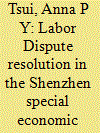

|
|
|
|
|
| Publication |
2009.
|
| Summary/Abstract |
Based on case studies in the Shenzhen Special Economic Zone, this article analyzes the modern labor dispute resolution system in China. Although heralded as a bold step towards marketization with convergent characteristics of the Western market economies, the system suffers from institutional hangovers from the previous era and lacks certain Western benchmark features. Among the factors affecting the system's implementation, ownership is found to be the most important. State-owned enterprises show the highest probability of establishing a dispute resolution system, whereas a lower degree of compliance is found in the nonstate-owned enterprises where strong market forces prevail. The existence of a trade union seems to have no impact on workplace compliance.
|
|
|
|
|
|
|
|
|
|
|
|
|
|
|
|
| 13 |
ID:
088692
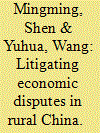

|
|
|
| 14 |
ID:
139559
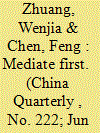

|
|
|
|
|
| Summary/Abstract |
The past few years have witnessed the revival of mediation as a chief method of labour dispute settlement in China. While the central government's campaign has reinvigorated the use of mediation in order to control social conflicts and maintain stability, its expansion and extensive deployment have also been driven by local authorities, as mediation can better serve their policy priorities and bureaucratic interests. Not only does the extension of mediation provide local bureaucratic agencies with flexibility and discretionary power to resolve conflicts without having to comply with legal minimums, it also legitimizes the courts' “non-legalistic approach” to settling dispute cases. The extensive employment of mediation by local authorities has chipped away at the role of legal procedures in settling labour disputes. The revival of mediation embodies a tension between the rule of law the government has promoted since the reform and the extrajudicial methods it needs for controlling conflicts.
|
|
|
|
|
|
|
|
|
|
|
|
|
|
|
|
| 15 |
ID:
083751


|
|
|
|
|
| Publication |
2008.
|
| Summary/Abstract |
China's elaborate system of local mediation committees has piqued researchers' curiosity for decades and sparked an argument in these pages. Crucial questions-concerning how much mediation actually takes place, what kinds of disputes are mediated, who seeks mediation, and how successful it is-have gone unanswered for lack of data. This article addresses these issues using original surveys from Beijing and villages in six provinces, supplemented by participant-observation research on actual instances of mediation. We find that mediation is fairly common in the country-side while occurring in a narrow set of contexts in the city. Those who are actively involved in institutions of grassroots governance are much more likely than others to seek such remedies, and in rural China, women pursue it more than men do. Modernization may diminish the salience of this form of dispute resolution, yet it is far from extinct, even in contemporary society
|
|
|
|
|
|
|
|
|
|
|
|
|
|
|
|
| 16 |
ID:
172321
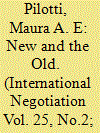

|
|
|
|
|
| Summary/Abstract |
Using a case study method, we examine how practitioners, including judges, arbitrators and community mediators, view dispute resolution in the Kingdom of Saudi Arabia (KSA). The goal of this study is to assess whether traditional approaches to dispute resolution coexist with or are discarded for imported modes. Participants were selected through convenience sampling. Structured interviews involved (a) participants’ general theoretical foundations, (b) key principles that govern their professional role, (c) their views of different roles, and (d) the extent to which traditional modi operandi persist. The results highlight the dominance of principles and practices of Sharia law over common law. Although the use of formal Western procedures was reported in commercial disputes and rarely in family and tribal matters, implementation was undeniably shaped by religious and kin-based social habits and values.
|
|
|
|
|
|
|
|
|
|
|
|
|
|
|
|
| 17 |
ID:
032458


|
|
|
|
|
| Publication |
London, UNITAR, 1970.
|
| Description |
67p.
|
|
|
|
|
|
|
|
|
|
|
|
Copies: C:1/I:0,R:0,Q:0
Circulation
| Accession# | Call# | Current Location | Status | Policy | Location |
| 006246 | 327.172/BAI 006246 | Main | On Shelf | General | |
|
|
|
|
| 18 |
ID:
178749
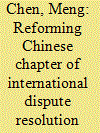

|
|
|
|
|
| Summary/Abstract |
As an increasingly important player in the international economy, China intends to contribute more to the improvement in international dispute resolution. To achieve the Belt and Road Initiative (BRI), China is actively coordinating its legal system to present an improved Chinese chapter of the international dispute resolution regime to facilitate increasing international trade and related national policies. Escalating conflicts with the United States have strengthened China’s determination to actively participate in international dispute resolution. This article presents a complete picture of the Chinese legal international dispute resolution regime and addresses several important innovations inspired by the BRI in the Chinese legal system. This article also elaborates on the latest developments in various dispute resolution methods that could provide more efficient dispute resolution services to both domestic and foreign disputants.
|
|
|
|
|
|
|
|
|
|
|
|
|
|
|
|
| 19 |
ID:
088691
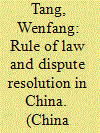

|
|
|
| 20 |
ID:
165246


|
|
|
|
|
| Summary/Abstract |
The rural poor and other marginalized people in Bangladesh are caught in a quandary. Neither the formal judicial system nor informal dispute resolution through local tribunals, called Shalish, is able to meet their needs. The formal system is hardly accessible and affordable to them and suffers from millions of pending cases. Informal dispute resolution through Shalish is notorious for unfair decisions based on local power structures and backward norms, as well as draconian enforcement practices. To remedy this situation, a 2006 law has reformed and redesigned Shalish under the guise of village courts. These village courts were introduced as an accessible, fair and affordable alternative to both the formal judicial system and traditional Shalish, but experience since 2006 has shown that they have their own flaws and require further reform. Drawing on popular perceptions in two Bangladeshi villages, this study finds that more attention should be paid to access for poor and otherwise vulnerable people, procedural fairness shielding litigants from local power structures, and matters of effectiveness. Only then can village courts truly fulfil their promise of providing redress for those most in need of social justice and human security.
|
|
|
|
|
|
|
|
|
|
|
|
|
|
|
|
|
|
|
|
|